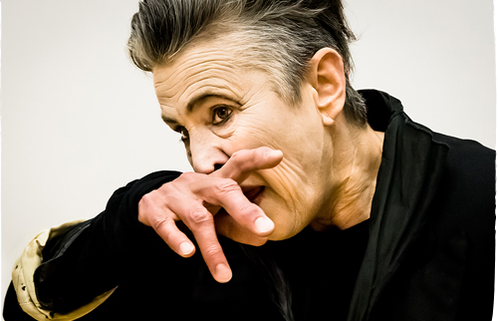Emilie Hope
The show stripped back the theatre-typical elements. The stage bare but for a desk stage-left with books, an early 2000s camera, and a magnifying glass stacked like a pre-Marie Kondo hoarder, hosting a large mirror almost as wide as the desk. On the far right of the stage, a stool. The show opened with a projected video of McNamara explaining the nature of the show is to examine our “colonial situation in Aotearoa and our position as pākehā and our white terrorism.” Between this video and another where McNamara is seen exploring her “big mouth” (which is “something I know about my whiteness”) through two camera lenses, she is lit softly from a light attached to the top of the mirror as she puts on her stage makeup, consisting of some lipstick, eyebrow liner, and, most importantly, whiteface powder.
There is no doubt in McNamara’s performative abilities. Her every movement is precise and natural, completely captivating the audience, starting slow with her movements and her voice. She enters each clowning character gently, giving them the space and time needed to explore themselves fully by beginning with still, slow movements, almost pantomiming. The costuming was expertly executed, McNamara wearing all black: long-sleeved tunic, scarf, leggings, boots, and an oversized blazer with the cuffs upturned to reveal a white satin lining. To me, this spoke of the somewhat blinding notion some of us have that we “don’t see colour”, but this reminds us that we are white on the inside and must recognize and acknowledge the privilege we have at our fingertips. This also emphasises the hands: what have these white hands done? What have they constructed? Can it be deconstructed? Not only was symbolism well thought out, the costume created a sense of androgyny that allowed McNamara to seamlessly enter a wide range of characters. The heartbreaking reality is how many characters we recognised on the stage.
The language and McNamara’s gentle entry into the characters opened the audience for moments of laughter, relaxing us into the space, as she explores sounds like “hello” and talks directly to the audience. The language for all characters was broken and often incomplete, only letting certain words fall through, like “what?”, “privilege?”, “I’m not”, “they get”, “I work”, etc.. These became key phrases for the clowning character she was playing, and a similar pattern with different words followed her various troupe of characters. I found this extremely powerful as we see both the performer and the character struggle with this conversation. Director and co-creator, Jade Eriksen, post-show profoundly said “a lot can be heard in the uttering.”
The Attitudes was powerful in and of itself. The mix of video projections with McNamara’s live performance in a space where the audience shared the same white light as the actor leaves the audience members with a plethora of thoughts and feelings to unpack about our role as pākehā, mixed-race peoples, and New Zealand racism. The performance itself is only forty-five minutes long, but at the end of the final video, projected slides explain “This is the end of that beginning” and the conversation can continue by staying after the performance for about twenty minutes or so, but the conversations do tend to run longer. McNamara and Eriksen did not begrudge those who wanted or had to leave, informing that if they would still like to be a part of the conversation, there was an email address they could contact: [email protected].
Staying back for the post-performance conversations was probably the most profoundly moving experience. Masterfully mediated by Eriksen, members of the audience shared their response to the art, sharing their stories, each of which hit me in this pākehā heart of mine. I did cry when I finally spoke. Eriksen held the room, the space, so effectively, creating a warm and inclusive environment for everyone to share. Both she and McNamara listened intently to everyone, looking at them in the eyes with a sincere furrowed brow, and opened the space for the utter well of emotion in all of us, some soft, some hard, to flow out.
This is the kind of art I live for. This is why I love theatre.
The Attitudes: Refusing Performance runs until Saturday 2 February, starting at 6:30pm. For more information about the performance or to book tickets, please visit the BATS Theatre website.






